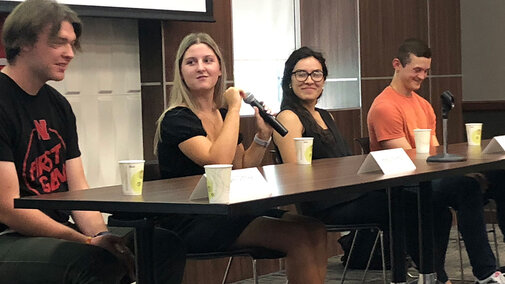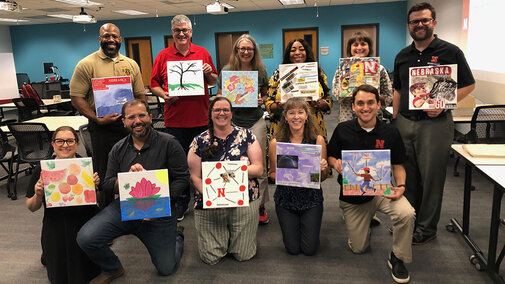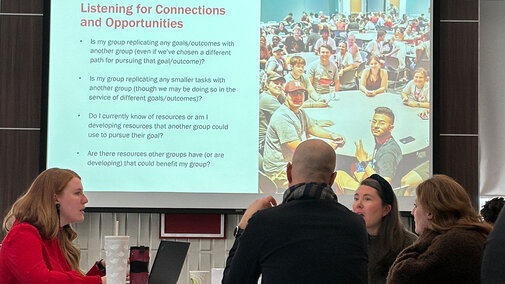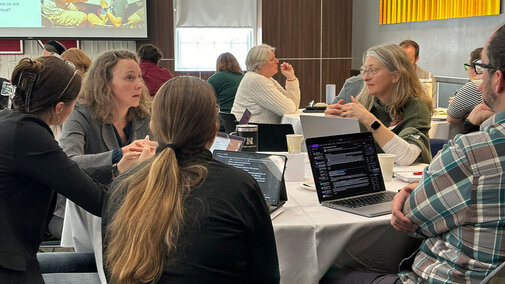UNL's Quality Initiative
Accreditation is a process of external quality review created and used by higher education to scrutinize colleges, universities, and education programs for quality assurance and quality improvement. Through institutional self-evaluation, peer review, and institutional response, formal educational activities as well as other activities essential to the effectiveness of an institution, such as governance and financial stability are evaluated.
The University of Nebraska–Lincoln is a member of the Higher Learning Commission, which expects that institutions are always engaged in quality improvement. Through HLC's Pathways for Reaffirmation of Accreditation, accredited institutions complete periodic reviews on a 10-year cycle to ensure they continue to meet the criteria for accreditation and pursue institutional improvement.
UNL completed a successful reaccreditation visit in 2016-17, followed by a successful year four assurance review in 2020-21. It will complete its next 10-year review in 2026-27.
There are two primary pathways to reaccreditation: Standard and Open. The Open Pathway model requires an institution to designate one major improvement effort it has undertaken as a Quality Initiative for reaffirmation of accreditation.
UNL's Quality Initiative, Building a UNL Culture Where Every Person Matters, focuses on applying the Ecology of Validation Framework to campus efforts in support of the N2025 vision of building a culture where every person and every interaction matters.
The Ecology of Validation framework is based on over a decade of research on learning communities across the University of Nebraska campuses by the Pullias Center for Higher Education. This research, titled Promoting At-Promise Student Success or PASS, describes common elements of a validating campus culture and strategies that faculty and staff can use to support undergraduates' persistence, degree completion, and career development, particularly those who have been historically underserved.
UNL's Quality Initiative documents the impact of the new Academic Navigator Team as well as other campus events and activities designed around the Ecology of Validation framework to improve undergraduates' retention, degree completion, and equity outcomes.
2023 First Generation Student Success Report 2022 Undergraduate Education Fall Update
"where every person and every interaction matters"
2022-2024 Quality Initiative Activities
Academic Navigator Team
Launched in 2022, the Academic Navigators are a granted-funded team of 10 staff members embedded within the academic colleges and the Explore Center dedicated to supporting undergraduates' persistence and degree completion. The Academic Navigator Team provides integrated support for a wide variety of student concerns — personal, academic, and financial — and connects students to appropriate campus and community resources. The Academic Navigator Team collaborates extensively with other campus units to foster a validating and integrated ecosystem for undergraduates' wellbeing and academic success.
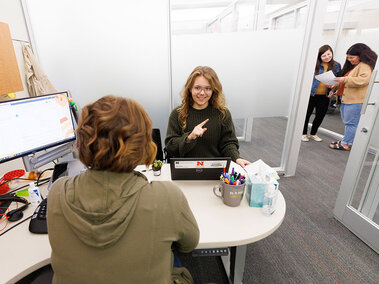
Campus Events
UNL's Quality Initiative also entails educating the broader campus community about the Ecology of Validation framework. Faculty and staff learned from panels and discussed student vignettes in small groups to help build their expertise with the Ecology of Validation framework through the following Promoting At-Promise Student Success professional learning community events:
- Forum, March 3, 2023. PASS Vignettes
- Summit on Leading for Student Success, May, 23, 2023.
- First-generation Student Summit, July 27, 2023.
- Summit on Leading for Student Success, October 13, 2023.
- Symposium: Supporting First-generation Students, November 10, 2023.
- Continuing the Conversation: First-generation Student Success Workshop, January 11, 2024.
- Continuing the Conversation Luncheon, February 27, 2024.
Event Participants
Staff and faculty from the below units have participated in one or more of the Promoting At-Promise Student Success events.
Colleges and Departments
Academic Advising
Academic Navigator Team
Agricultural Sciences and Natural Resources Advising
Architecture Advising
Arts and Sciences Advising
Business Advising Center
Business Teaching and Learning Center
Center for Academic Success and Transition
Center for Transformative Teaching
College of Law
Department of Agricultural Leadership, Education, and Communication
Department of Agronomy and Horticulture
Department of Anthropology
Department of Biological Systems Engineering
Department of Chemistry
Department of Civil and Environmental Engineering
Department of Communications Studies
Department of Criminology and Criminal Justice
Department of Educational Psychology
Department of English
Department of History
Department of Hospitality, Tourism and Management
Department of Management
Department of Mathematics
Department of Modern Languages
Department of Nutrition and Health Sciences
Department of Philosophy
Department of Plant Pathology
Department of Political Science
Department of Psychology
Department of Sociology
Department of Special Education and Communication Disorders
Department of Teaching, Learning, and Teacher Education
Department of Textiles, Merchandising, and Fashion Design
Durham School of Architectural Engineering and Construction
Engineering Advising Center
Engineering Scholar Programs
Engineering Student Services
Explore Center
Global Experiences: Education Abroad
Honors Program
Institute for Ethnic Studies
Journalism and Mass Communications Advising
Nebraska College Preparatory Academy
Nebraska Forestry
Political Attitudes and Cognition Lab
School of Biological Sciences
School of Computing
School of Criminology and Criminal Justice
School of Global Integrative Studies
School of Music
School of Natural Resources
Undergraduate Research and Fellowships
University Libraries
Campus Partners
Alumni Association
ASUN Association for Student Government
Big Red Resilience and Well-being
Campus Recreation
Career Services
Center for Advocacy, Response and Education
Clifton Strengths Institute
College of Agricultural Sciences and Natural Resources Dean's Office
College of Architecture Dean's Office
College of Arts and Science's Dean's Office
College of Education and Human Sciences Dean's Office
College of Engineering Dean's Office
College of Fine and Performing Arts Dean's Office
College of Journalism and Mass Communications Dean's Office?
Counseling and Psychological Services
Custodial Services
Enrollment Services
Fraternity and Sorority Life
Gender and Sexuality Center
Housing and Dining
Husker Hub
Information Technology Services: Academic Technologies
Institutional Effectiveness and Analytics
Learning Communities
Military and Veteran Success Center
Nebraska Unions
New Student Enrollment
NUtech Ventures
Office of Academic Success and Intercultural Services
Office of Admissions
Office of Diversity and Inclusion
Office of Graduate Studies
Office of Scholarships and Financial Aid Financial Aid
Office of the Executive Vice Chancellor
Office of the University Registrar
Services for Students with Disabilities
Student Accounts
Student Advocacy and Support
Student Affairs
Student Conduct and Community Standards
Student Leadership, Involvement and Community Engagement
Student Legal Services
TRIO Programs
Undergraduate Analytics
Undergraduate Education and Student Success
Undergraduate Education Programs
William H. Thompson Scholars Learning Community
Campus Efforts
Student Referral Guide
A new Student Referral Guide has been created to further promote a validating and integrated ecosystem of student support. It was developed in response to questions from faculty and staff asking which campus resources were best to support students' academic, social, and emotional wellbeing. The guide outlines issues students commonly face and features three campus teams equipped to receive referrals and follow-up with coordinated student care and support: Student Advocacy and Support, the Academic Navigators, and Counseling and Psychological Services. The online guide provides links and information for each of these teams. The guide is also available as a printed card and magnet, which direct those making a referral to the online guide at go.unl.edu/refer.
PASS Fellows Learning Community
From 2021 to the present, the PASS Fellows Learning Community, comprised of faculty and staff from across campus units, met monthly to discuss the Ecology of Validation framework and related research to identify change-strategies designed to enact their vision of a culture of validation for at-promise students through individual and campus-based projects.
PASS Fellow Kristy Saunders led a year-long working group to comprehensively review student messaging from key campus units using a checklist that they developed grounded in the Ecology of Validation framework. Staff from the offices of Husker Hub, University Registrar, Scholarships and Financial Aid, Student Accounts, and Academic Advising Units each reviewed five communication campaigns from their own units and provided feedback to the other units' communications. Collectively, they revised 44 communications to be more validating for students.
PASS Fellow Deepak Keshwani integrated the Ecology of Validation framework into the hiring process for a new team member in the Department of Biological Systems Engineering. BSE shared the Ecology of Validation framework with candidates prior to their campus interview and candidates were asked to respond to scenarios of students' experiences drawing upon the framework norms.
PASS Fellow Courtney Santos integrated the Ecology of Validation framework within the New Faculty Development panel where speakers shared narratives about encouraging student success through collaboration with staff in Career Services, Global Experiences, University Honors, Learning Communities, and William H. Thompson Scholars. Santos also shared the Ecology of Validation framework in research mentor professional development resources, events, and newsletters, reaching more than 100 undergraduate research supervisors.
Training and Professional Development Specialist C.J. Venable created a Canvas module introducing the Ecology of Validation framework, the PASS Project that spurred it, and key related concepts such as belonging, validation, and change. The module includes information, additional resources, and reflective activities to help move the framework into practice.

